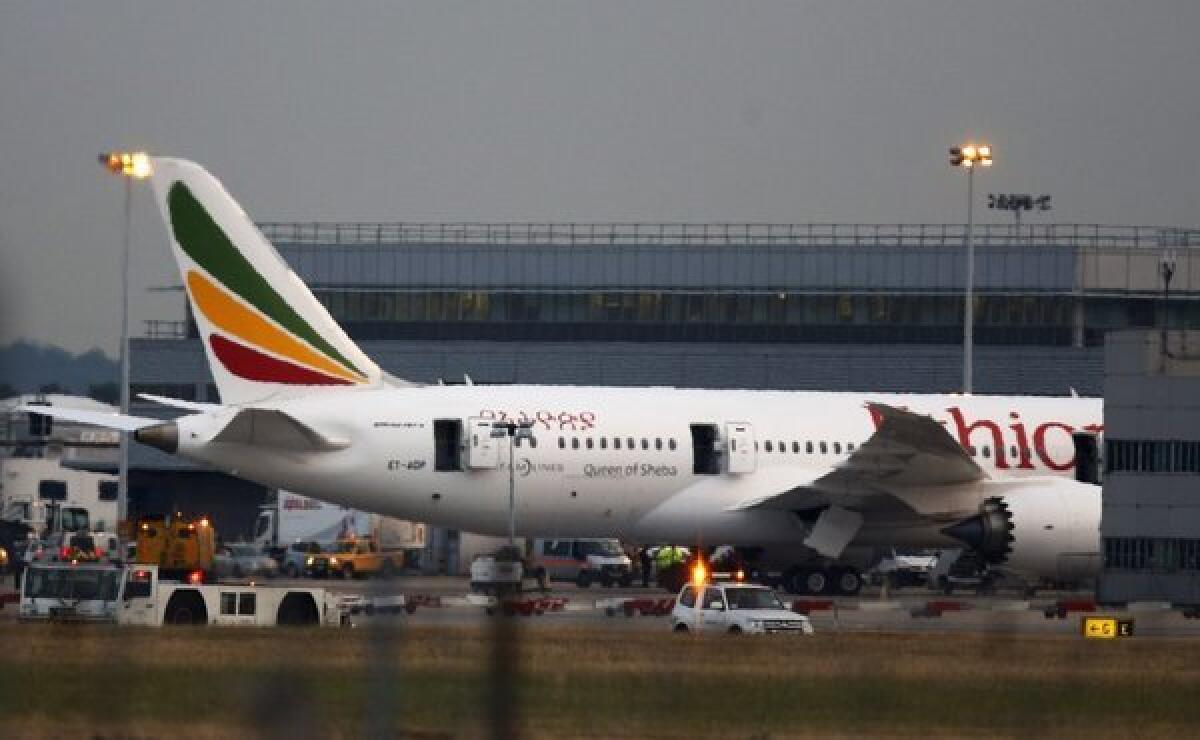FAA to require inspections on 787 Dreamliners after London fire

- Share via
The Federal Aviation Administration is developing a plan requiring airlines to inspect the emergency devices on their Boeing 787 Dreamliners after a fire erupted on the plane last week while it was parked at London’s Heathrow Airport.
On Friday the agency said these mandatory inspections “would ask operators to inspect for proper wire routing and any signs of wire damage or pinching, as well as inspect the battery compartment for unusual signs of heating or moisture.”
The FAA plan is not expected to ground the worldwide 787 fleet, as happened earlier this year. The inspections can be done in an overnight stop by a certified mechanic, officials said.
FULL COVERAGE: Boeing’s troubled Dreamliner
The FAA’s announcement came one day after British investigators issued a “special bulletin” urging U.S. regulators to conduct an extensive safety review.
“Federal aviation regulations do not require large commercial aircraft in scheduled service to be equipped with these devices,” the FAA said in a statement. “Over the weekend, the FAA will be communicating its intentions to aviation safety regulators in other countries.”
The British accident investigation team’s initial three-page report outlines what happened on the burned Ethiopian Airlines plane and its emergency locater transmitter, which emits signals to emergency crews in crisis situations.
The transmitter model, made by Honeywell International Inc., is installed on the top of the 787 near the tail of the plane, where the fire started last week. The 787 contains a set of chemical batteries using lithium-manganese dioxide.
“Indications of disruption to the battery cells,” the report said. “It is not clear, however, whether the combustion in the area of the [emergency locater transmitter] was initiated by a release of energy within the batteries or by an external mechanism such as an electrical short.”
Honeywell said the transmitter has been certified by the FAA since 2005 and is installed on thousands of commercial planes. The company said it supported the FAA’s plan for inspections as a “precautionary measure.”
The FAA said its forthcoming “Airworthiness Directive” regarding the device will focus on the 787 and not other aircraft.
“We have provided instructions to customers giving them the required information to meet their regulatory guidelines,” Boeing said in a statement.
It is unclear whether the inspections will later be broadened to include other aircraft.
The FAA grounded all 787s for nearly four months this year after lithium-cobalt batteries on two planes overheated, with one catching fire.
Boeing has delivered 68 of the planes to 13 airlines and aircraft leasing companies.
ALSO:
Asiana Airlines passengers look to sue airline, Boeing over crash
British authorities blame transmitter in Boeing 787 Dreamliner fire
Boeing 787 Dreamliner makes unscheduled landing at Boston airport
More to Read
Inside the business of entertainment
The Wide Shot brings you news, analysis and insights on everything from streaming wars to production — and what it all means for the future.
You may occasionally receive promotional content from the Los Angeles Times.










